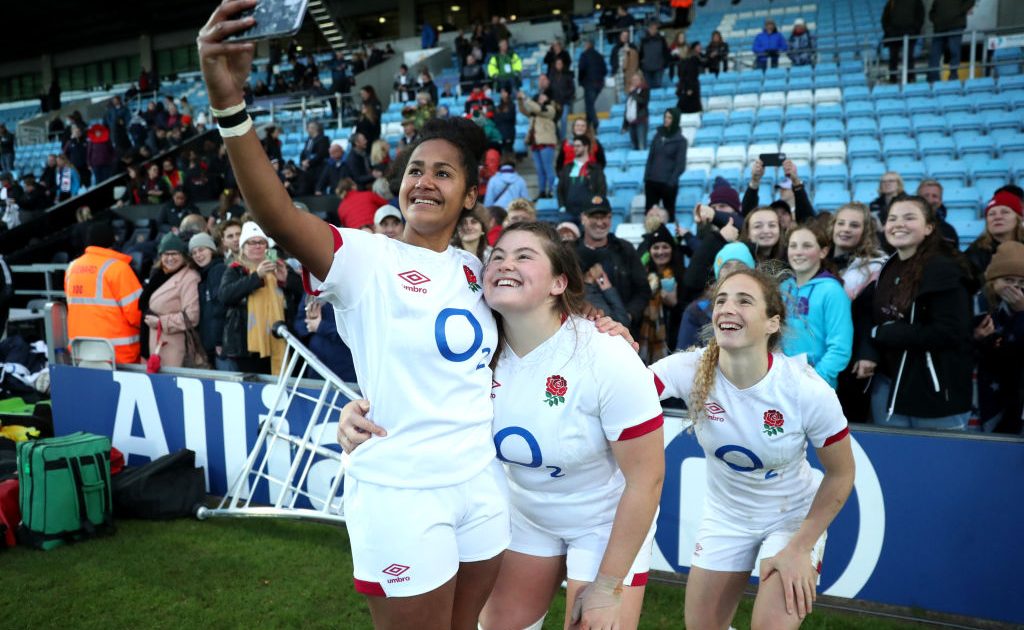'IWD is still needed, but sportswomen are being valued more highly'

I’ve had a few moments in the past year where I’ve been overwhelmed by the growth of the women’s game. I was only playing for England ten years ago and the change we’ve seen in a decade is remarkable.
When I was doing commentary at Kingsholm for the Women’s Six Nations last year, during the anthems I got emotional as we were in a sold-out stadium, a match where you needed a paid ticket to attend- it was amazing. I have the privilege of being able to look back on the early days and my games for England, when we played at Twickenham with 4,000 people there and compare that now to the 35,000 tickets already sold for this year’s Six Nations clash between England v France, it demonstrates just how far the game has come.
The growth of the club game is even more obvious because club matches used to be on the second team pitch, round a corner, with terrible changing rooms, warming up in a car park, where spectators couldn’t buy food or even hang around afterwards because there wasn’t even a proper club house. To now where, despite the Premier 15s being only five years old, it’s has gone from a place of playing on pitches with no seating or food available to games being played at Kingsholm, Franklin’s Gardens, the Twickenham Stoop and the Stone X Stadium where clubs are regularly getting thousands of people showing up and the games being live streamed and shown on the BBC.
Because of the increased standard and exposure of the Premier 15s and the Red Roses, people know the player’s names and are having conversations about the tactics of the game, such as asking who’s going to play ten for England this Six Nations with Zoe Harrison out with injury. There are also so many interesting stories behind these players which people resonate and relate to. I believe the way to continue growing the women’s game is through telling these stories.
Take Ruby Tui, for example, I was in a press conference recently where, the way she spoke, the whole room was silent, they were enthralled by her. She’s a fantastic asset for growing the game as we know it’s about more than the rugby and I think the women’s game has got it right in realising that, more so than the men’s game.
Happy International Women's Day.
Can you make out our superheroes?#IWD2023 #Rugby #WomeninRugby pic.twitter.com/pzUnFVksL5
— RugbyPass (@RugbyPass) March 8, 2023
The Red Roses have outspoken and approachable players such as Poppy Cleall and Hannah Botterman, they’re not England robots who have been media trained, they have personalities and that’s good for the game and for the people following it.
The women’s international game also still has a lot of older players who have lived through the days when their sport wasn’t taken seriously and now they’re being paid to play. This means players give a lot more back to the game and are happy to sign shirts and take selfies after matches and engage with the fans because they have the appreciation that it wasn’t always this way.
I remember a time where we had to sew our own sponsor badges on to our England shirts before a sevens tournament as we weren’t allowed one of the sponsors the men had. We laugh about it now because it just seems so unthinkable.
I do think the playing side of the game in terms of professionalisation has moved a lot faster than the coaching side of things. Unfortunately, even in the past few years I’ve applied for coaching roles and when I’ve read the job description it has said the ideal candidate, ‘he should be and he should have…’ and I’ve messaged them to let them know they are limiting themselves from accessing amazing talent by the language they are using. These clubs would then turn around and apologise and ask me to put in my application anyway and I’d reply saying ‘I don’t think the club would have the right environment for me to want to work there.’
You just wonder if I put a man’s name down with my credentials and my playing history, would I have got an interview?
You are seeing more female coaches in the Premier 15s with the likes of Susie Appleby, Jo Yapp and Amy Turner, but I just hope this soon translates through to the international arena. Even in the women’s game there was only one head coach at the World Cup in New Zealand, so something has to be done to improve the pathways to enable women to get to the top.
I think International Women’s Day has grown over the years and until you get equal representation in all walks of life, I believe we still need it. In the past on International Women’s Day, I’ve had companies ask me to come and do a talk and they want you to do it for free, and I always think, ‘can’t you see the irony in your request, on a day that’s supposed to celebrate and promote equality and women?’
However, on the whole I believe things are changing and people are starting to value sports women more highly. As a former player I’m being paid to attend more corporate events and hospitality on match days, whereas before people didn’t know about the women’s game so unions wouldn’t have even thought about it.
I’m excited to see the game continue to make waves and for the players to become more recognisable and familiar to the fans as we enter into an exciting international calendar, with the Women’s Six Nations, the Pacific Four competition and the WXV all to come later in the year.

































































